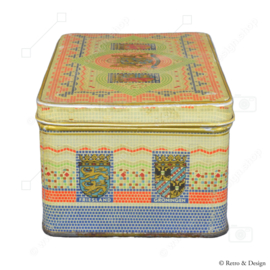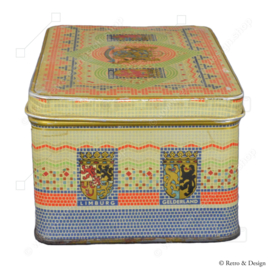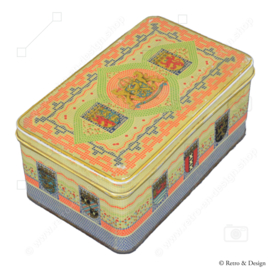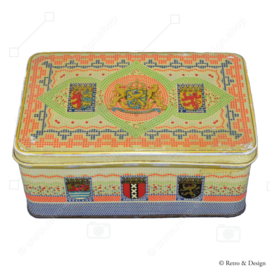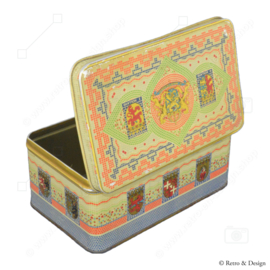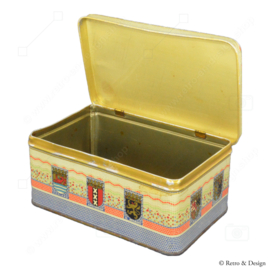SOLD
Rechthoekige blikken trommel met afbeelding van 12 provinciewapens in mozaïek voor De Gruyter
SKU: BT-4345-23SOLD
Rectangular tin with an image of 12 Dutch provincial coats of arms in mosaic by De Gruyter
- Manufacturer: Nederlands Vereenigde blikfabrieken
- Date of manufacture: 1940/1980
Description
Rectangular tin with hinged lid and rolled edge. The hinge is a hanging hinge with loose tabs. The decoration of the tin consists of a multi-coloured checkered embroidery pattern that gives it an appearance like a mosaic. The lid shows the arms of the Netherlands, North-Holland and South-Holland. On the front of the tin is the coat of arms of Zeeland, Amsterdam and Noord-Brabant. On the right on the short side; Limburg and Gelderland. On the left; Overijsel, Utrecht and Drenthe.
Text embossed at the bottom: And better value, and 10 per cent discount, only the Gruyter (translated from Dutch).
Condition
This tin is in an original vintage condition with traces of use and age-related traces of wear.
Dimensions
- Height: 7.7 cm.
- Length: 17 cm.
- Width: 10.5 cm.
De Gruyter was a retailer in the Netherlands in the 19th century and 20th century (until 1976). At its peak there were more than 550 stores and nearly 7,500 employees.
Piet the Gruijter (1795-1867), started in 1818 in 's-Hertogenbosch with a horse fry mill, a listing for the processing of legumes, seeds, and grains. Later, his son Louis (1833-1911) took over the company. The clientele consisted mainly of farmers near 's-Hertogenbosch.
At the end of the 19th century, a chain of stores was added, initially in 's-Hertogenbosch. In 1896 a shop in Utrecht was opened and in 1902 one in Amsterdam.
The leadership of the company De Gruyter had also included a third generation: the children Lambert (1873-1951) and Jacques (1875-1950). In 1912 began the roasting of coffee.
An important element in sales policy was giving 10% discount on the presentation of receipts. The slogan of De Gruyter became "And better value and ten per cent, only De Gruyter". This loyalty was rewarded and they had an additional means to control the store managers. Because De Gruyter only sold own brand products prices did not compare to those of others.
In 1913 the 44th store opened in the Netherlands. Most stores were at that time located in the four major cities of the Netherlands.
In the compartmentalized Netherlands De Gruyter was the shop of Catholics, and Protestants chose among others for Albert Heijn. With the depolarization, these ratios were gradually loosened after 1950.
In the sixties, the De Gruyter group reached its peak. There were more than 550 stores and nearly 7,500 employees. In 's-Hertogenbosch had arisen large production sites. The group had food shops scattered throughout the country.
As a customer's binder De Gruyter started in 1948 to give away every week a small gift for children: the legendary Candy of the week. It was introduced after the Second World War when there was no supply of sugar. With the buy of a few guilders of groceries, free candy was given away to the children. Later, the "sweet" was a plastic toy, a game, a doll or a book every week something else.
Some translations come from an automated system and may contain errors
Country of origin
Netherlands - Holland
Kind of object
Biscuit tin - cookie tin
Theme
Provinces - Coats of arms
Decoration
Coats of arms
Category
Vintage tins
Color
Multicoloured
Publisher
De gruyter
Manufacturer
Thomassen & Drijver - Verblifa N.V.
Brand
De gruyter
Material
Tin - metal - paint
Particularities
12 provincial coats of arms - hinged lid
Era
1940 - 1980
Quality
Vintage with traces of use
Height
7,70 cm
Lenght
17,00 cm
Width
10,50 cm
Shipping method
Parcel post with track & trace










